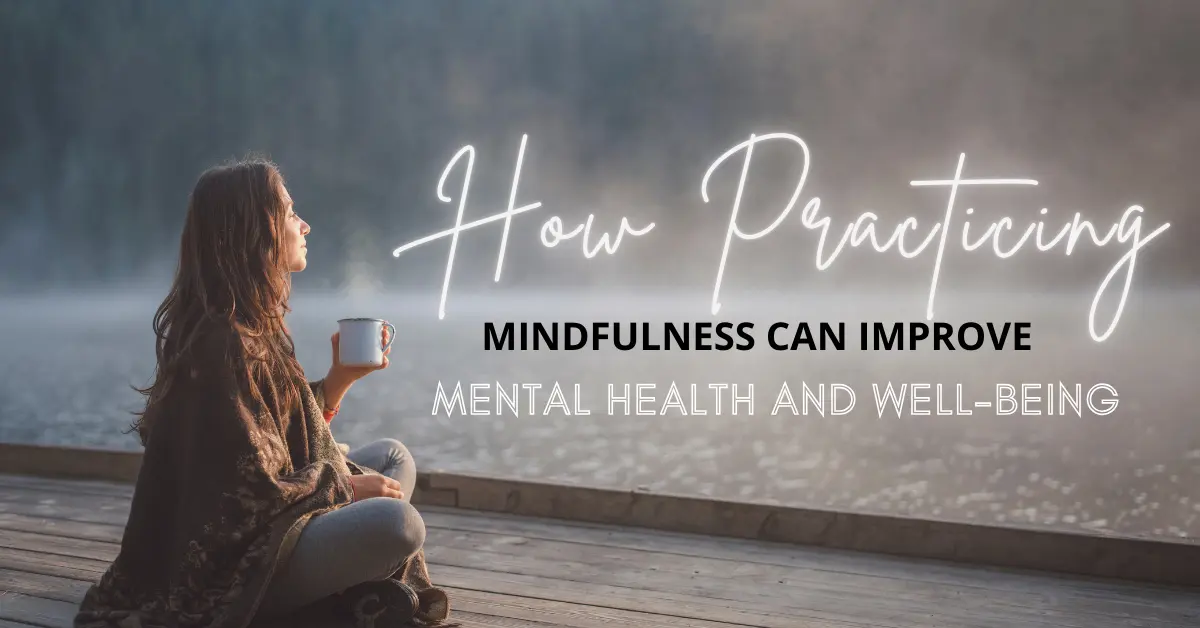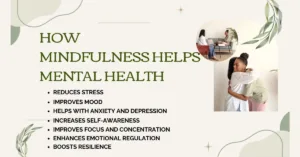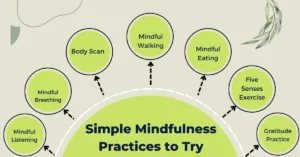
How Practicing Mindfulness Can Improve Mental Health and Well-being
- 135
- 0
- 0
Practicing mindfulness is crucial for enhancing mental health and well-being. It encourages individuals to stay present and fully engage with their thoughts and feelings, reducing stress and anxiety. By fostering self-awareness, mindfulness helps people recognize negative thought patterns and cultivate a more positive mindset. Regular mindfulness practices, such as meditation and deep breathing, can improve emotional regulation and resilience, leading to better coping strategies in challenging situations. Overall, mindfulness promotes a sense of calm and balance, contributing to improved mental clarity, emotional stability, and overall quality of life.
How Practicing Mindfulness Can Improve Mental Health and Well-being
In our fast-paced world, prioritizing mental health is crucial. Practicing mindfulness is an effective way to achieve this, helping to promote calm and balance amidst the busyness of everyday life. This simple yet powerful technique can help us feel better, reduce stress, and improve our overall well-being. In this blog post, we’ll talk about what mindfulness is & “How Practicing Mindfulness Can Improve Mental Health and Well-being”.
What is Mindfulness?

Mindfulness is the practice of paying attention to the present moment without judging it. It’s about being aware of our thoughts, feelings, and surroundings right now, instead of worrying about the past or future. When we’re mindful, we try to accept things as they are, without trying to change them or wishing they were different.
How Mindfulness Can Improve Mental Health

Practicing mindfulness can have many positive effects on our mental health. Here are some of the ways it can help:
Reduces Stress
A major advantage of mindfulness is its ability to lower stress levels. When we’re stressed, our minds often race with worries and negative thoughts. Mindfulness teaches us to step back from these thoughts and focus on the present moment. This can help calm our minds and make us feel more relaxed.
Improves Mood
Mindfulness can also help improve our mood. By paying attention to the present moment, we can learn to appreciate the good things in our lives, no matter how small. This can help us feel more positive and content.
Helps with Anxiety and Depression
For people who deal with anxiety or depression, mindfulness can be a helpful tool. It can teach us to recognize negative thought patterns and learn to let them go, rather than getting caught up in them. This may gradually alleviate symptoms of anxiety and depression.
Increases Self-Awareness
Practicing mindfulness can help us become more aware of our thoughts, feelings, and behaviors. This increased self-awareness can help us understand ourselves better and make positive changes in our lives.
Improves Focus and Concentration
Mindfulness exercises often involve focusing on one thing, like our breath or a specific activity. This practice can help improve our ability to concentrate and pay attention in other areas of our lives.
Enhances Emotional Regulation
By practicing mindfulness, we can learn to observe our emotions without getting carried away by them. This can help us manage our emotions better and respond to situations in a calmer, more balanced way.
Boosts Resilience
Mindfulness can help us build resilience, which is our ability to cope with difficult situations. By learning to stay present and accept things as they are, we can become better at handling life’s challenges.
Simple Mindfulness Practices to Try

Now that we know how mindfulness can help, let’s look at some easy ways to start practicing it:
Mindful Breathing
A simple way to practice mindfulness is to concentrate on your breathing. Here’s how:
- Choose a cozy spot where you can sit or lie down comfortably.
- Close your eyes if you want to.
- Focus on your breathing as it flows in and out.
- If your thoughts drift, calmly guide your attention back to your breath.
- Practice this for a few minutes daily.
Body Scan
A body scan is a great way to check in with your body and relax:
- Lie down or sit comfortably.
- Starting at your toes, focus your attention on each part of your body, moving upward.
- Notice any sensations in each area without trying to change them.
- If you notice any tension, try to relax that area as you move on.
Mindful Walking
You can practice mindfulness while walking:
- Walk at a normal pace.
- Focus on the sensation of your feet making contact with the ground.
- Notice the movement of your legs and arms.
- If your mind wanders, bring your attention back to the physical sensations of walking.
Mindful Eating
Eating mindfully can help you enjoy your food more and improve digestion:
- Before you eat, pause for a moment to observe your food.
- Notice the colors, smells, and textures.
- Take small bites and chew slowly.
- Pay attention to the flavors and how the food feels in your mouth.
- Notice how your body feels as you eat.
Five Senses Exercise
This activity allows you to engage more deeply with your environment. Pause for a moment and notice:
- 5 things you can see
- 4 things you can feel
- 3 things you can hear
- 2 things you can smell
- 1 thing you can taste
Mindful Listening
Practice mindful listening in your daily life:
- When talking with someone, give them your full attention.
- Listen without planning what you’ll say next.
- Notice the tone of their voice and their body language.
- If your mind wanders, gently bring it back to the conversation.
Gratitude Practice
Focusing on things we’re grateful for can boost our mood:
- Each day, think of three things you’re thankful for.
- They can be big or small things.
- Try to notice new things each day.
Tips for Making Mindfulness a Habit
Starting a new habit can be challenging, but here are some tips to help make mindfulness a regular part of your life:
- Start small: Begin with just a few minutes of practice each day.
- Set a regular time: Try to practice at the same time each day to make it a habit.
- Use reminders: Set alarms on your phone or leave notes for yourself to remind you to practice.
- Be patient: It takes time to see the benefits of mindfulness, so don’t get discouraged if you don’t notice changes right away.
- Find what works for you: Try different mindfulness practices and see which ones you enjoy most.
- Don’t judge yourself: If your mind wanders during practice, that’s okay. Just gently bring your attention back.
- Make it part of your routine: Try to include mindfulness in your daily activities, like brushing your teeth or waiting in line.
Overcoming Common Challenges
As you start practicing mindfulness, you might face some challenges. Here are a few common examples and ways to address them.
- “I don’t have time”: Remember that even a few minutes of practice can be helpful. Try to find small moments throughout your day for mindfulness.
- “My mind keeps wandering”: This is normal! The practice is about noticing when your mind wanders and gently bringing it back. Over time, this gets easier.
- “I’m not doing it right”: There’s no “right” way to practice mindfulness. As long as you’re trying to pay attention to the present moment, you’re doing it correctly.
- “I feel uneasy or agitated”: It’s perfectly normal to feel this way. Try to observe these feelings without judgment. You can also try different positions or shorter practice times.
- “I keep falling asleep”: If this happens during longer practices, try shorter sessions or practice at a time when you’re more alert.
The Science Behind Mindfulness

Research has shown that regular mindfulness practice can lead to changes in the brain. Studies have found that mindfulness can:
- Enhance the gray matter in brain regions associated with learning and memory.
- Reduce activity in the amygdala, the part of the brain involved in stress and anxiety
- Improve connections between different areas of the brain, which can help with emotional regulation.
These changes in the brain help explain why mindfulness can have such positive effects on our mental health and well-being.
Conclusion
Practicing mindfulness is a simple yet powerful way to improve our mental health and well-being. By learning to pay attention to the present moment, we can reduce stress, improve our mood, and better handle life’s challenges. Whether it’s through mindful breathing, body scans, or simply paying more attention to our daily activities, there are many ways to bring mindfulness into our lives.
Keep in mind that mindfulness is a skill that requires time to cultivate. Be gentle with yourself as you begin your practice. Even a few minutes of mindfulness each day can make a big difference over time. So why not give it a try? Your mind and body will thank you for it.
FAQs
Q: What is mindfulness?
A: Mindfulness is the practice of being present and fully engaged in the moment. It involves paying attention to your thoughts, feelings, and surroundings without judgment, helping to reduce stress and increase awareness.
Q: How does mindfulness help reduce stress?
A: Mindfulness helps reduce stress by promoting relaxation and awareness. By focusing on the present, you can break free from negative thought patterns, leading to a calmer mind and better coping with daily challenges.
Q: Can mindfulness improve my focus and concentration?
A: Yes, practicing mindfulness can enhance focus and concentration. By training your mind to stay present, you can reduce distractions and improve your ability to concentrate on tasks, leading to increased productivity.
Q: How often should I practice mindfulness?
A: It’s best to practice mindfulness daily, even if it’s just for a few minutes. Consistency is key, so find a routine that works for you, whether through meditation, deep breathing, or mindful activities.
Q: What are some simple mindfulness practices I can try?
A: Some easy mindfulness practices include deep breathing exercises, mindful walking, body scans, or simply focusing on your senses. Choose activities that resonate with you and integrate them into your daily routine for the best results.
Also Read:
The Benefits of Meditation and Mindfulness
References:
https://pmc.ncbi.nlm.nih.gov/articles/PMC10355843/
Disclaimer:
This blog highlights mindfulness benefits for mental health and well-being. It is not a substitute for professional treatment. Always consult a qualified mental health professional for personal concerns.
Related post

7 Health Benefits of Assam Tea


